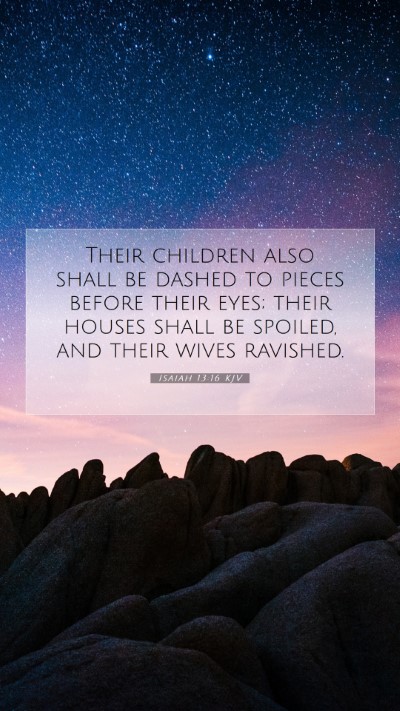Understanding Isaiah 13:16: Bible Verse Meaning and Commentary
Isaiah 13:16 states: "Their children also shall be dashed to pieces before their eyes; their houses shall be spoiled, and their wives ravished." This verse presents a harsh prophecy regarding the fate of Babylon, conveying the calamity that would befall its inhabitants as part of God’s judgment.
Context and Background
In the context of Isaiah chapters 13-14, the nation of Babylon is depicted as an adversary of God's people, and these passages serve as prophecies concerning its eventual destruction. Historical scholars often associate this prophecy with the fall of Babylon to the Medes and Persians in 539 BC. It highlights the severe judgment of God over a nation that represented pride and opposition to His will.
Key Themes
- Divine Judgment: The torment and destruction described serve as representations of God's righteous judgment against sin.
- Consequences of Sin: The imagery depicted conveys not only physical destruction but also emotional devastation, illustrating the dire consequences that follow disobedience.
- The Vulnerability of Society: The focus on families and homes being targeted underscores the wide-reaching effects of warfare and violence, emphasizing that no one is immune from God’s judgment.
Interpreting Isaiah 13:16
From various public domain commentaries, insights suggest the portrayal of God’s justice is vivid in this passage. According to Matthew Henry, this prophecy serves to demonstrate God's control over nations and His perfect judgment against those who would bring harm to His chosen people. He implies that the destruction of Babylon was preordained as a means of delivering justice on a national scale.
Albert Barnes emphasizes the brutal reality of judgment, noting that the imagery of children “dashed to pieces” is meant to evoke a sense of urgency and seriousness regarding God’s wrath. He portrays this as a necessary consequence to display divine retribution, emphasizing the end of oppression.
Adam Clarke interprets this verse within a theological context, suggesting it reflects broader spiritual truths around the consequences of societal sinfulness. Clarke indicates that while the prophecy was directed at Babylon, its implications transcend time – serving as a warning to all nations against defiance to God's ways.
Application for Today
Understanding this verse today can bridge knowledge from ancient circumstances to modern applications. Believers are called to reflect on their lives and societies; questions arise about how current actions may align with divine expectations. The verse challenges readers to consider the fabric of their community, the significance of ethical living, and the dire consequences of failing to uphold values of justice and righteousness.
Cross References
- Jeremiah 50:21-22: Prophecies regarding the fall of Babylon.
- Revelation 18:21: God’s judgment upon Babylon the Great.
- Psalms 137:8-9: Expressions of sorrow for Babylon's fate and the call to ruin those who destroy God's people.
Final Thoughts
In-depth analysis of Isaiah 13:16 suggests that understanding scripture is essential for reflecting on God's nature, justice, and the repercussions of disobedience. This verse offers a sobering reminder of the importance of aligning one’s life with divine principles, and the historic judgment rendered upon civilizations serves as a timeless lesson for all generations.
Keywords: Bible verse meanings, Bible verse interpretations, Bible verse understanding, Bible verse explanations, Bible verse commentary, scripture analysis, biblical exegesis, Bible study insights, meaning of Bible verses, understanding Scripture, and others.


